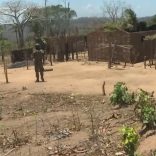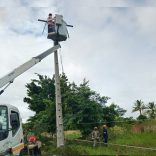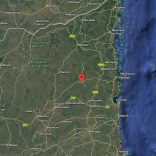Mozambique: Four killed by terrorists in Memba district - AIM report
Armed groups intensify violence in northern Mozambique, UNODC warns

File photo: DW
The UN Office on Drugs and Crime (UNODC) said in Maputo on Thursday (12.09) that armed violence in Cabo Delgado province in northern Mozambique was “intensifying” and could threaten regional security.
“The so-called terrorist groups have been increasing the intensity of the attacks in Cabo Delgado province,” a statement reads.
The UN agency issued the note following “high-level consultations” with Mozambican state officials intended to shape a “Comprehensive Strategic Plan of Action in Response to Organised, Transnational Crime, Drugs and Terrorism.”
Border weakness

At the meeting with the Mozambican authorities, UNODC Director of Terrorism Prevention Massood Karimipor said that “criminals and terrorists are exploiting weak borders and surveillance in general, particularly in northern Cabo Delgado province, to raise funds, plan, and mobilise criminal and violent activities.”
UNODC, he continued, stood ready to “provide additional assistance to the Government of Mozambique to prevent and combat crime and terrorism in accordance with international conventions and standards.”
UNODC’s representative in Mozambique, César Guedes, expressed concern about the increased use of Mozambican territory for drug trafficking, mainly heroin from Afghanistan.
“In recent years, provinces in the coastal region have become gateways for the entry and exit for illicit goods such as drugs arriving from Afghanistan,” the statement.
quoted Guedes as saying.
Biodiversity exploitation
Wildlife and forest crimes have also been discussed on the event, Mozambique being the locus of transnational organised crime bent on exploiting its rich biodiversity.

“Trafficking in wild fauna and flora, along with crimes in the fisheries value chain, steal natural resources and prevent valuable income from being used to support the social and economic development of resource-dependent communities,” the note reads.
“We all acknowledge that in recent decades Mozambique has lost 80% of its elephant population and that in 2014 the last wild rhinos were hunted by criminals,” Jorge Rios, who heads the area in the fight against crimes on wildlife and forests at UNODC, noted.
Violence since 2017
According to information collated by Lusa, the wave of violence in Cabo Delgado has, since 2017, caused the deaths of some 200 people, including residents, alleged perpetrators and members of the security forces.
The attacks occur in the region where ongoing natural gas exploitation works are located.
The ‘jihadist’ Islamic State group first announced in June that it was associated with one of the attacks, but the Police of the Republic of Mozambique (PRM) reported at the time that this information was not true.












Leave a Reply
Be the First to Comment!
You must be logged in to post a comment.
You must be logged in to post a comment.